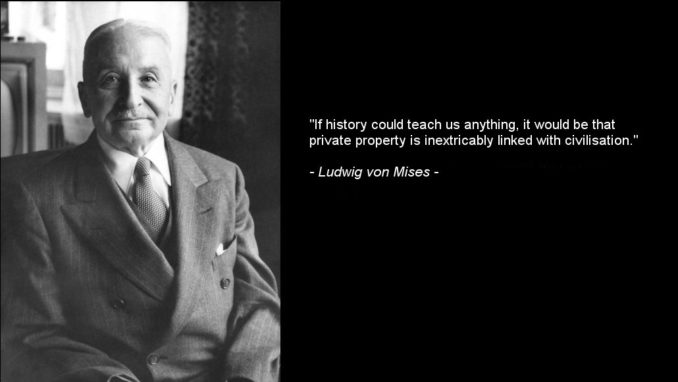
“There can be no socialism without a state, and as long as there is a state there is socialism. The state, then, is the very institution that puts socialism into action; and as socialism rests on aggressive violence directed against innocent victims, aggressive violence is the nature of any state.”
Hans-Hermann Hoppe, A Theory of Socialism and Capitalism: Economics, Politics, and Ethics
Collectivism is extremely versatile and very easy for political animals to “sell” to the public and to weaponize. Politics, of course, by its nature is always the pursuit of the Left, if we are to follow strict definitions. It seeks to influence and coerce others and it abhors individual liberties and self-determination. What we know as far-right is national socialism and the rest is international socialism. Either way, it is all collectivism in different shapes and forms.
Sometimes it takes advantage of the fears and the (often legitimate) grievances of all those hard working citizens that feel betrayed and left behind. It promises them protection, retribution and special privileges in the future – they can have all that and more, if they vote for a strong State.
Other times, this ideology exploits social rifts and latches onto racial tensions, religious frictions, gender clashes or economic divides. It then shape-shifts into a diametrically opposite political product: it brands itself as “radical left”, socialist or even openly communist. It targets the disenfranchised, the marginalized, the poor and the disadvantaged. But it also preys on the elites, especially those who enjoy merely inherited and entirely unearned privilege, who are are insecure and in desperate need of a purpose, a project or a label that they hope will validate them. In this form, collectivism promises to deliver the disruption and destruction of the status quo, to punish all the “oppressors”, to raze the entire system to the ground and to forcefully establish a utopian vision of social order. Once again, all that and more can be accomplished, if the body politic chooses to be governed by a powerful government.
Of course, in both cases, what the frustrated and discontent voters fail to take into account is that if their Rulers are given enough power to compel and to coerce their fellow citizens to comply with their demands, the very same Rulers can do the same to them. Those in power care not about the people they govern, they only care about holding onto their power to govern; they are laser-focused on tightening their grip and expanding their control. Statists have no moral compass, no values and no principles. They will unabashedly abandon previous positions and “deep, personal convictions”, they will betray allies and embrace sworn enemies in a heartbeat and without compunction, if they believe it would help them gain more influence and power.
Voting in an election is, and has been for a very long time, a mere illusion of choice. There is no substantial difference between political parties, between individual candidates or even between ideological alternatives like “Left and Right”. Both seek to expand their control and both intend to achieve that by using and abusing governmental tools and powers that facilitate the habitual intimidation, privacy intrusion, financial subjugation, censorship, detention or excommunication, and even the elimination of statehood and personhood of any given individual they choose to target, for whatever reason, be it legally defensible or not.
This brings us to the second very important thing that most voters fail to factor in: there are no new “temporary” rules and regulations and no “emergency powers” that any government has ever actually, practically and fully relinquished once the crisis was over. Some cases are more obvious than others, and there might be an exception or two that confirms the rule, but all in all, once the State gains an extra inch of power and control, it will do whatever it takes to defend it. As the (in)famous saying goes, “Never let a crisis go to waste”.
To wit, the Patriot Act in the US became the new normal and effectively eradicated any remaining morsels of privacy for law abiding citizens (“you have nothing to fear, if you have nothing to hide”). The ridiculous, exasperating, humiliating, largely theatrical and almost entirely ineffectual airport security procedures we all have to go through every time we need to travel have become universally accepted as a fact of life.
“Anti money laundering” and “anti terror” legislation erased every last fragment of financial self-determination and banking secrecy. This didn’t really impact actual money launderers or terrorists of course, since they quickly found ways around the rules (criminals are quite good at that sort of thing generally), but it did affect ordinary citizens who now have their account activity automatically monitored and regularly reported, who can have their deposits frozen at any time, on mere suspicion and without any notification. They can be barred from accessing and withdrawing their own money, as was the case in Greece and later in Lebanon. They can even wake up one day to find a significant chunk of their hard-earned savings missing, unashamedly and brazenly stolen by their government to pay its own debts, as we saw in Cyprus.
Also, let us not forget about the “temporary emergency powers” that many states assumed during the covid crisis (largely arbitrarily and without democratic consent) that became permanent: in some cases, governments retained the authority to impose lockdowns and close schools indefinitely. Last but certainly not least, we shouldn’t overlook the ease with which nations flout their own rules too: after seizing Russian assets as a result of the sanctions following the invasion of Ukraine, the Western allies went a step further earlier this month and decided to use $50 billion from said frozen funds to extend a loan to the Ukrainian government – an unprecedented move that crosses the line from seizure to expropriation.
It is interesting, though also very likely seriously disconcerting, to engage in a thought experiment and imagine how much further a desperately indebted and hopelessly dysfunctional government would be prepared to go to remain in power. How many more freedoms could be curbed overnight, how many more rights could be “temporarily” suspended? What possible defense strategies and what contingency plans would remain viable and realistically accessible to the individual citizen?
What is more independent and insulated from the entire banking and financial system, more reliable as a store of value, more practically dependable as a unit of account and more portable, more easily divisible and widely acceptable as a medium of exchange than physical gold and silver?
I’ve always insisted on making this very point clear to my clients and friends: Without a doubt, physical precious metals are a great long term investment, they provide an unmatched hedge against inflation and they offer a truly safe haven in times of market turbulence and uncertainty.
However, their most important function and their greatest advantage is not their capacity for portfolio stabilization. It is their unique ability to retain real value, even if, or when, everything else loses its own.
This work is licensed under a Creative Commons Attribution 4.0 International License. Therefore please feel free to share.



